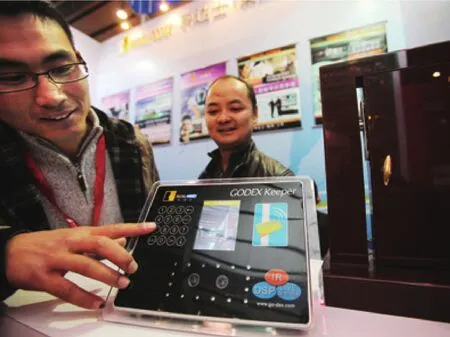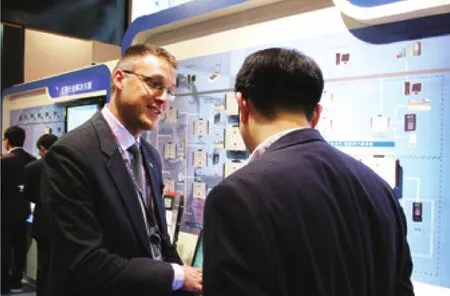Safety Guard
2010-10-14ByTANGYUANKAI
By TANG YUANKAI
By JAMES A. DORN
Safety Guard
By TANG YUANKAI
Identification monitoring systems have been widely installed in Niujie Street,Xicheng District, even in 46 underground spaces. The system is connected to wireless door magnetic sensors that are triggered by activity around doors and windows, which in turn trigger surveillance cameras. The system then sends pictures and messages to residents’ cellphones. Information can also be used to help police to catch criminals.
This is just one example of security applications in China. It has been 30 years since China ‘s security industry began to develop,covering areas such as research and development, manufacturing, marketing, systematic integration, operation of warning systems and intermediary services. Meanwhile, the function of security systems has expanded from prevention of criminal activities to positive management and behavior prediction. Signi fi cant achievements were on show in the 2010 China International Exhibition on Public Safety and Security in November.More than 800 corporations participated in the exhibition, 120 of which came from more than 20 countries.
Jin Xiufeng, Secretary General of the China Security and Protection Industry Association, said at the exhibition greater efforts will be made to encourage technological innovation and upgrade standards for security and urban emergency applications.She said more products and technology applicable to ordinary communities, families and citizens should also be developed, which could lead to a larger market for the security industry.
Huge market
Dai Lin, a postgraduate from the Department of Electronics at Tianjin University, landed his first job in a factory manufacturing security products in 1991.Now, his company has become the setter of standards for the domestic security and monitoring industry. It all began the day a client asked him if he could design a security system for a bank.
With serious security concerns, banks are the first as well as the most demanding customers for security products and systems. They began installing monitoring and alarm equipment when most people didn’t know what they were. But, if security has to be guaranteed, more should be done besides. Accordingly, for many years,financial institutions, such as banks, have been following technological advancements to update their security facilities and systems. They even became testing grounds for new security technologies and products, and have produced a huge market, a veritable gold mine.
Up until now, security systems in China’s financial institutions have gone through three phases: analog cameras (from the early 1980s to the late 1990s); digital hard disk video recorders (1999-2004) and Internet-based monitoring systems (2004-2007). And now, the fourth phase is on its way, which relies on smart applications.
When Dai founded Tiandy Tech in 2000,most security products in China used analog signals for monitoring. He discovered a type of equipment that could control a camera like the human brain was technologically advanced and commercially viable. The company finally developed its proprietary products and a supporting signal digitalization technology that greatly enhanced

SECURITY CONCERN:Visitors are impressed by an access control system displayed at the 2010 China International Exhibition on Public Safety and Security
coverage area and reaction speed of the products.
In the past 10 years, Tiandy Tech has developed 143 security and monitoring products of seven types, including network video,optical communication and access control systems. They are a leader of technology in China.
Tiandy Tech’s security equipment was extensively used in the Asian Games,which concluded on November 27 in Guangzhou, Guangdong Province. In 2008,the company was the only supplier of security equipment for the Olympic Games due to its full product lines, 3G applications in particular.
A lot of money was spent on security for the Olympic Games, and the budget for the access control system alone was approximately 414 million yuan ($60.88 million). TheChina Police Dailysays the market for security applications in fi nancial institutions alone (not including projects)has reached more than 1 billion yuan ($147 million) each year.
Greater opportunities
“Chinese people are more willing to spend money on security products as well as research and development on their technologies. Along with the economic and social progress of each passing day and the greater emphasis on security issues in China,we now have greater opportunities,” said Craig Sandness, Managing Director of HID Global’s Asia-Paci fi c Region.
HID Global was established in 1991.Its Asia-Paci fi c regional of fi ce was founded in Hong Kong in 2003, with representative offices throughout the Chinese mainland.HID was recently selected by the prestigious magazineA&Sas one of the top 10 security brands (access control category). It’s the seventh year in a row that HID has been so honored.
A large number of capital infrastructure projects, office buildings and residential communities in China are introducing the most advanced security equipment manufactured by HID. China Unicom, Shanghai Pudong Airport, Shanghai Hongqiao Airport and the Terminal 3 of the Beijing Capital International Airport have become clients of HID.
HID also offers multi-level authorized solutions for Postal Savings Bank of China’s Beijing building, which has nearly 300 access control zones and occupies a total area of 110,000 square meters. Staff access cards may also be used for dining,exercise and parking areas, and attendance checks. The card is also connected to the building’s fi re facilities, and can be used to activate the alarm system and open emergency doors if necessary.

TALKING BUSINESS: Craig Sandness, Managing Director of HID Global’s Asia-Pacific Region, introduces the company’s products to a visitor at the 2010 China International Exhibition on Public Safety and Security
The company has also developed the“HID on the Desktop” program. By using the access cards together with a secure pin,staff can securely log onto their computers and encrypt computers (avoiding the password process). When a worker leaves his or her seat, by taking away the card, the computer automatically turns off and other cards are not able to turn it on again. This guarantees personal as well as corporation privacy and the danger of being hacked is eliminated.
“’HID on the Desktop’ maintains the characteristics of our products: great adaptability to users’ needs, fl exible application and easy management,” said Sandness.“Security enterprises should provide the best products while saving costs. Also, they should guarantee lifetime warranty service.HID has managed to accomplish those tasks by combining years of research and development and progressively improving technological support.
“Success starts with listening,”Sandness said. Maintaining good communication with clients has become a corporate culture for HID. Its agents in China are responsible for collecting feedback from clients. “Most of our products are developed in response to the demands of Chinese clients. By further improving or expanding the functions of existing products, we can satisfy their needs better or even think ahead of their needs.”

By JAMES A. DORN
